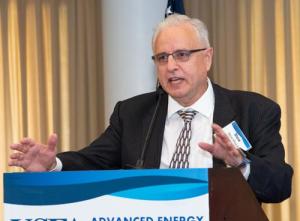Recapturing Our Industry’s Spirit
Steve Mitnick is President of Lines Up, Inc., Editor-in-Chief of Public Utilities Fortnightly, author of “Lines Down: How We Pay, Use, Value Grid Electricity Amid the Storm,” formerly an expert witness that testified before utility regulatory commissions of six states, the District of Columbia, the Federal Energy Regulatory Commission, and in Canada, and a faculty member at Georgetown University teaching undergraduate microeconomics, macroeconomics and statistics. He’s been around awhile but not as long ago as during the industry’s first growth spurt of innovation.
Today, the eleventh of November, is Samuel Insull's Birthday. We're in Insull's debt for his many breakthroughs for the utilities industry, in the late nineteenth century and the early twentieth. Not the least of which is, literally, the innovation of utility regulation.

From Insull's memoirs,
"I was president of the National Electric Light Association [predecessor to the Edison Electric Institute] in 1897 and 1898. At the annual convention of the Association, held in Chicago on June 7th, 1898, I advocated public control and private operation, or in other words, the regulation of public utilities. I was criticized by a great many people in the public utility business at the time, as I was of the first men occupying a prominent position in the industry to take the position that, as the business was a natural monopoly, it must of necessity be regulated by some form of governmental authority. I have consistently taken this position as I am a strong believer that a business in connection with which competition is an unsound economic regulator, its affairs must be subject to proper governmental authority."
He wrote his memoirs in 1934 while awaiting trial. Insull, later acquitted of all charges, had been blamed by many including President Franklin Roosevelt for the collapse of his vast utility holdings and to an extent the great depression.
One of the most prized documents in Public Utilities Fortnightly's archives is the Federal Trade Commission's schematic of those vast holdings as of 1932, two years prior. It shows the origins of most of today's electric and natural gas investor-owned utilities. A year after Insull's writings and his acquittals, Congress enacted the Public Utilities Holding Company and Federal Power Acts of 1935, not coincidentally.
Imagine if Insull's decade-long battle for utility regulation, which was won in Wisconsin first and then in other states commencing in 1907, had flagged. The investor-owned utilities like Insull's had struggled to raise sufficient capital to fully build out the grid - beyond the most prosperous communities - amid competition, the huge sums needed, and the vagaries of customer demand. And whenever an investor-owned utility emerged from competition, becoming a monopoly, the public outcry was enormous.
This wasn't a problem for the municipally-owned utilities of the early twentieth century. Though they too were extremely capital-constrained. And then the Panic of 1907 drove many of them into a severe crisis.
Suppose that Insull's innovation of utility regulation hadn't taken hold. Then the utilities industry wouldn't have gained access to the massive amounts of capital that was ultimately needed to electrify most of the nation's population by the nineteen thirties. Regulation made that happen. (Though, the expansion of utility service into the countryside would require the federal government's intervention via the Rural Electrification Act of 1936.)
Insull's career spanned the utilities industry's first growth spurt of innovation. From when Thomas Edison hired Insull as his personal secretary in January 1881 to the nineteen thirties, the period was a frenzied race of creativity and invention. However the decades that followed are better characterized as consolidation, incremental advancement and execution of the dreams of Thomas Edison, Samuel Insull, George Westinghouse, Nikola Tesla, Charles Coffin, Owen Young, etc.
But now let's turn to the utilities industry's second growth spurt of innovation underway in our day. Innovation is clearly in the air. For instance, the PUF team attended Exelon's ginormous annual innovation expo, as usual, this year on the tenth of October. There were gigawatt-hours galore of energy, enthusiasm and excitement among the thousands of utility employees at the innovation expo. Take a glimpse in a photo-story that follows.
While we were there, we got to see the especially energetic keynote speaker, Bill Nye the Science Guy. Nye's theme was, we can change the world! He shouted this slogan several times during his rousing speech. The audience - perhaps a thousand utility employees strong - reacted with glee each time.
Nye perfectly captured the spirit of the utilities industry. Our spirit during the industry's first growth spurt of innovation, concluded some ninety years ago. And our spirit during the industry's second growth spurt, commencing only a handful of years ago.
Utilities are unlike other businesses. Sure, investor-owned utilities have shareholders, quarterly reports, dividends and the like. But they're more accurately public service organizations. The utility people I know are really dedicated to their communities. And well aware of the almost unlimited potential of electric service to enhance our lives. Utility people are at their best when they're innovating to further fulfill that potential to, as Nye says, change the world.
And that's what the hundred and thirty-seven Fortnightly Top Innovators 2019, all of them celebrated in this issue of PUF, are doing. They're changing the world. Look through those pages and see for yourself how they're doing it.
Oh, one more thing about Samuel Insull and Exelon. Insull headed Exelon's predecessor company, Commonwealth Edison, over a hundred years ago. How about that?


